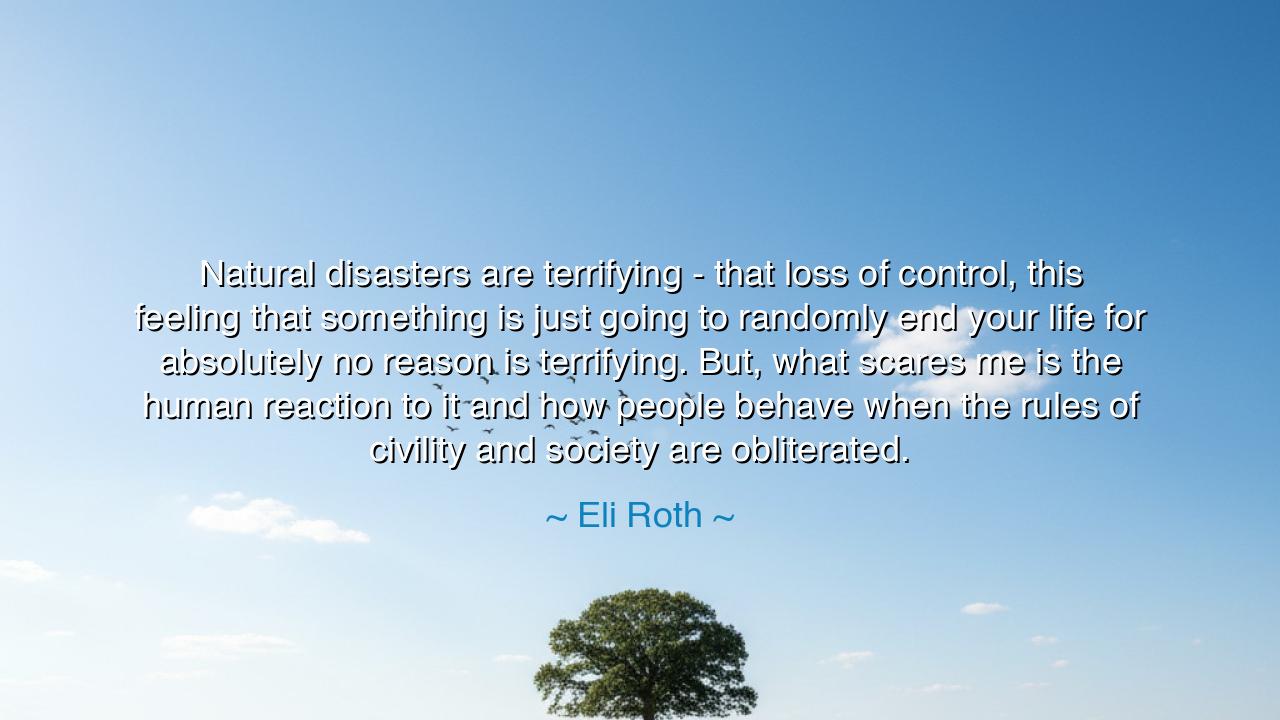
Natural disasters are terrifying - that loss of control, this
Natural disasters are terrifying - that loss of control, this feeling that something is just going to randomly end your life for absolutely no reason is terrifying. But, what scares me is the human reaction to it and how people behave when the rules of civility and society are obliterated.






Hear now the words of Eli Roth, fierce in their clarity and dreadful in their warning: “Natural disasters are terrifying—that loss of control, this feeling that something is just going to randomly end your life for absolutely no reason is terrifying. But, what scares me is the human reaction to it and how people behave when the rules of civility and society are obliterated.” This utterance is not a passing observation but a mirror held to the fragile heart of humankind. For while the mountains may quake, the seas may rise, and the winds may howl, it is not only the fury of nature we must fear, but the storm that awakens in the human breast when order is shattered.
The origin of this truth lies in the dual nature of man: noble and beast, builder and destroyer. When life flows in peace and the rules of law stand firm, the mask of civility holds steady. But when fire rains from the heavens or the waters swallow the earth, the thin veil is torn, and the raw spirit of survival emerges. Some rise as saints, offering food, shelter, and courage. Others descend as wolves, seizing power, hoarding supplies, or unleashing cruelty. Thus Roth speaks of a terror beyond the natural: the terror of society unbound, when the fragile scaffolding of law crumbles, and every soul is cast into the wilderness of choice.
Consider the great flood of Hurricane Katrina in the year 2005. The levees broke, the city of New Orleans drowned, and the people were left stranded in heat and hunger. In that crucible, the dual truth of humanity revealed itself. There were those who rescued neighbors in boats, who shared their last crumbs of bread, who lifted the weak upon their backs. Yet there were also those who looted, who turned upon one another, who cast aside compassion for survival. The floodwaters were terrifying, yes—but the greater terror was in the streets, where the rules of society dissolved like salt in the tide. This is the living proof of Roth’s warning.
For disasters strip away illusions. They remind us that we are not masters, but dwellers in a world whose breath can crush us in a moment. Yet the deeper fear comes from within, when order collapses and each heart must decide anew: shall I act with virtue, or with vice? Shall I remember my brother and my sister, or devour them in my hunger? These moments are revelations, and they carve into history the truth of who we are.
Still, let us not despair. For though chaos reveals the beast, it also reveals the hero. In the fires of earthquakes and storms, countless nameless ones have arisen to embody courage. After the great earthquake of 2011 in Japan, many citizens stood in long, patient lines for food and water, refusing to steal though hunger gnawed at their bellies. They chose order when chaos beckoned, compassion when selfishness tempted. They proved that disaster does not demand cruelty, but tests the will of the human spirit.
Therefore, the lesson is this: when the world collapses, it is not nature alone we must withstand, but the trial of our own hearts. The true terror is not the flood or the fire, but the betrayal of virtue. And the true hope is not in the strength of walls or the height of levees, but in the steadfastness of human decency when everything else is gone. For no storm can sweep away the man or woman who has chosen to be a pillar for others.
What then shall you do? Prepare not only your home, but your spirit. Stock not only food and water, but compassion and courage. In times of peace, train yourself in kindness, that it may rise instinctively in times of turmoil. In moments of fear, resist the voice that says, “Save only yourself,” and instead ask, “Whom can I lift?” For in the darkest hours, when civility falters, the world does not need more survivors—it needs more guardians.
So remember the words of Eli Roth. Fear the flood, yes. Fear the quake, yes. But fear most of all the silence of your own conscience when tested. For when the rules of society are obliterated, you will stand naked before the truth of who you are. And if you choose well, if you hold fast to compassion, then even in the ruins, humanity will not perish, but endure.






AAdministratorAdministrator
Welcome, honored guests. Please leave a comment, we will respond soon